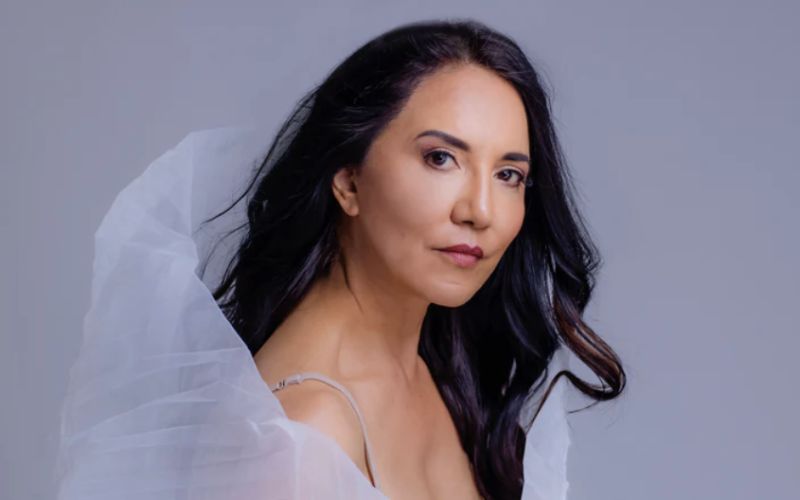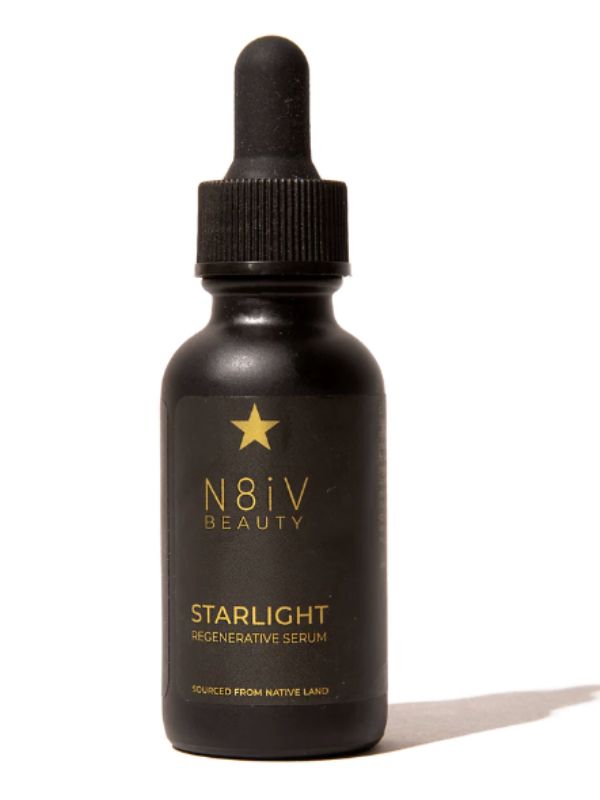
- Details
- By Neely Bardwell
Ruth-Ann Thorn, a citizen of the Rincon Band of Luiseño/ Payómkawichum Indians in Southern California, owns several art galleries and now, a steadily growing beauty business. She currently resides in Paloma Valley where her family has lived since time immemorial. In 2018, she moved back to the reservation to take care of her father, and while there, found her passion for reconnecting with her roots and serving her people.
Thorn's brand, N8iv Beauty, is the first skincare brand created by a Native woman and the first to be infused with acorn oil sourced from Tribal land. The brand utilizes traditional plant medicine in its skincare line and aims to propel Indigenous practices and knowledge to the forefront of the global beauty industry. Thorne uses knowledge gifted to her by her Tribal Elders, who introduced her to traditional botanicals and natural ingredients and the power of the acorn.
Thorn recently talked to Native News Online about what inspired her to start N8iv Beauty, how she incorporates cultural teachings and values into the brand, and her plans to grow it into a $100 million beauty industry powerhouse.
What inspired you to start N8iv Beauty?
My daughter. I think she was about 14 years old, and we went to Sephora to look for makeup. I am a big fan of Korean skincare, so I went to my Korean section, and she asked me “Hey, Mom, where's the Native American section?” And that is what spurred my thought on the importance of bringing a Native American brand to market within the trillion dollar beauty industry.
As the brand developed, I realized that it's also about giving our people an opportunity to share our culture through a brand like this. I think it's a safe space when you think about beauty. I mean, we've been utilizing beautification rituals since time immemorial. Even though Hollywood has always painted us as savages, just a step above the caveman in a lot of ways, or objectifying women, if you really look at the history of who we are as Native people, taking care of ourselves has been a really important part of who we are. And we took care of ourselves with plant medicine.
Before colonization happened, we were a country of around 100 million people who bartered and traded with people from all over the world. We were sharing things because we were a country before the colonies ever came. We were bartering with our plant medicine with you know, our arts. With various things, buffalo hide, you name it, peacefully trading. I've had Native people say, “Well, why are you sharing that with people?” Well, because we've always shared. That's our culture. And a lot of times I think we don't even know our own history.
 N8iv Beauty’s Starlight Regenerative Acorn Oil Serum. (photo/n8ivbeauty.com)How do you incorporate your cultural teachings into the daily running of the brand?
N8iv Beauty’s Starlight Regenerative Acorn Oil Serum. (photo/n8ivbeauty.com)How do you incorporate your cultural teachings into the daily running of the brand?
I think it starts with the logo itself. Initially, the name of the company was called “Native American Beauty,” but then the more I thought about it, I didn't really feel like America has anything to do with who we are, so I dropped that. I really wanted to come to market with something that was a little bit more modern.
As I was studying our Luiseño Payómkawichum culture, I started finding out about the fact that I always knew we were kind of a nomadic people as hunter-gatherers, but then a good friend of mine who's an anthropologist, she said, “We have an eight-season calendar that we follow”. And I had seen Native spelled with an eight, and I thought, that's perfect. We're going to change the name to N8iv Beauty, and the eight will represent the eight-season calendar that we follow as hunter-gatherers, and then the star is because, in our creation story, we are the star people. We come from the Milky Way in our creation story. So it starts with our logo, we're able to share a culture just directly through our logo, and then it expands into our plant medicine.
I'm really trying to bring a philosophy across to the end user of the difference between Native culture, our views on beauty, and the colonial culture, which I call the pyramid scheme, which is still alive and well today. When the colonies came over, they brought the monarchy. When you think about the Victorian era or these various eras, you think about the Kardashian era. You've got two components that really drive beauty: wealth and fame. If you're wealthy, and you're famous, you're going to set the beauty trends. From the colonial viewpoint, some people are more valuable than other people.
Within a Tribe, we had a round or a flat leadership style as a circle. Every single person within that tribe was equally valuable. What I'm trying to say with N8iv Beauty is that every single person is one of a kind. We take that from nature. There are no two leaves on a tree that are exact. There are no two animals with the same animal print. Everything in nature is like a snowflake. Everything is completely unique. I want to bring across the idea that every single person who uses our product should look in the mirror and celebrate their uniqueness; that there will never ever be another one of them.
What do you want those who use N8iv Beauty skincare to know?
It's natural and organic. We're utilizing plant medicines that have been used to heal the skin for 1000s of years, specifically from my culture here on the West Coast. But My goal is to go to other places across Turtle Island and meet with other Indigenous people like me from other tribes because we all have different plants that we utilize.
Right now, I'm working with the Hopi tribe, and I'm creating a blue corn and pumpkin peel mask, that will really highlight their culture because we don't have Blue Corn here on the West Coast. I feel like the product line will continue to grow over time. Based on the fact that we have 537 federally recognized tribes, there's a lot of material to cover.
Do you hope to see your brand one day in stores like Sephora and Ulta and other big stores?
We just got our first contract with Nordstrom, so it's a good place to start. My goal is to build a $100 million company and to go global with this. This is not about the money. But about showing the world that even though yes, we are connected with the Earth, don't be mistaken. We've been savvy business people since the inception. We have done business with people from all over the world, and we are very strong at business. I want to create the space so that maybe I'm first in, but I'm hoping the next generation takes over beauty within who we are as Native people. I'm opening it up, but I'm hoping lots will follow.
What advice would you give to any aspiring Indigenous entrepreneurs?
If you want to go into business, first of all, figure out what you want to do, and where your passions lie, and then go work for somebody who's doing that. At least get the principles. I think getting an education and an MBA are fantastic things, but they aren't necessarily what is going to propel you to face the business world. You've got to get into the real day-to-day. School is really a great informational space, but you can't learn until you get into the pool and start swimming. So go work for somebody; learn off of somebody else's dime if at all possible. Get an understanding of what the lane is that you're going to go into and then be ready to work.
A popular question when it comes to Native businesses is, ‘Can non-Natives use it too’?
I think everybody can use it. We're creating a brand that's also unisex, but I would say the main thing is going back to our history. We bartered and traded with people from all over the world for thousands of years, and this is something that I think is really important for us as Native people. We tend to keep ourselves within our communities, we tend to sell our products at powwows. We tend not to venture into the mainstream, and a lot of times, not everybody but a lot of people almost feel like we're not being sacred if we are sharing our secrets with the world, but my feeling is that if you look at what we did historically, we traded with people, we traded our baskets, we traded our jewelry, our plant medicine, tobacco, and we exchanged it for other goods and things that we utilize in innovation.
We are still reeling from the largest genocide the world has seen in the last 300 years, our nervous system has been inherited by our ancestors, and we have a lot of anxiety and a lot of fear. We need to start to venture off the reservations and make a statement that we're still here, that we are a modern, sophisticated group of people, like we've always been.
I had CVS reach out to me. They're interested in N8iv Beauty. They want me to create something that's a little bit more price point friendly and, in other words, cheap. I decided that we've been ‘Dollar Store people’ for way too long. We were one of the richest groups of people in the world. We had all of these resources at our fingertips, and we took care of them. I want to build a brand that shows the luxury people that we are because that's what we are. We're not ‘Dollar Store people’.
Our time is now to build something and to build this awareness that we're here. We're resilient, we're smart. We've always been those people. So why not now step out and make that statement because there's just not that many of us still around. And if we're not going to do it now, when are we going to do it?
More Stories Like This
Vision Maker Media Honors MacDonald Siblings With 2025 Frank Blythe AwardFirst Tribally Owned Gallery in Tulsa Debuts ‘Mvskokvlke: Road of Strength’
Zuni Youth Enrichment Project and Partners at Ho’n A:wan Productions Launch 8th Annual Delapna:we Project
Chickasaw Holiday Art Market Returns to Sulphur on Dec. 6
Center for Native Futures Hosts Third Mound Summit on Contemporary Native Arts
Help us defend tribal sovereignty.
At Native News Online, our mission is rooted in telling the stories that strengthen sovereignty and uplift Indigenous voices — not just at year’s end, but every single day.
Because of your generosity last year, we were able to keep our reporters on the ground in tribal communities, at national gatherings and in the halls of Congress — covering the issues that matter most to Indian Country: sovereignty, culture, education, health and economic opportunity.
That support sustained us through a tough year in 2025. Now, as we look to the year ahead, we need your help right now to ensure warrior journalism remains strong — reporting that defends tribal sovereignty, amplifies Native truth, and holds power accountable.
 The stakes couldn't be higher. Your support keeps Native voices heard, Native stories told and Native sovereignty defended.
The stakes couldn't be higher. Your support keeps Native voices heard, Native stories told and Native sovereignty defended.
Stand with Warrior Journalism today.
Levi Rickert (Potawatomi), Editor & Publisher


